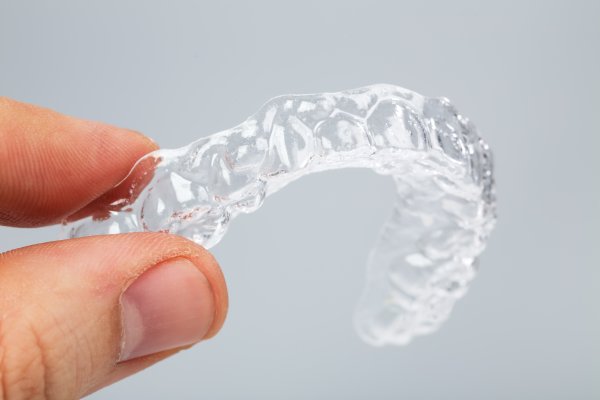Invisalign Versus Braces: How They Differ

Many people are opting for alternatives to traditional metal braces for correcting misaligned teeth, such as Invisalign®. This clear plastic orthodontic aligner, which resembles a retainer, straightens crooked teeth and closes tooth gaps without the need for metal wiring or other hardware. Individuals who want to correct such dental issues may want to understand the differences between Invisalign® and metal braces before making the best choice for their oral health.
About metal braces
Braces have long been the traditional manner for straightening crooked or misaligned teeth. Many individuals require and wear these braces, including the following:
- Children under 12
- Teens
- Young adults under age 30
Some middle-aged dental patients have opted for metal braces as well, especially to correct oral issues that occur later on in life.
Metal braces are a system of bands and brackets put in place by a dentist or orthodontist. Exams and x-rays may be performed to determine how long the braces must be worn to achieve the optimum effect. These braces are not removable by the wearer, but adjustments can be made by a dentist if any of the brackets or wires are uncomfortable.
The pros and cons of metal braces
Metal braces have several advantages and drawbacks dental patients may want to consider before choosing between this traditional hardware and Invisalign®. Metal braces tend to work quickly and can straighten crooked teeth in a matter of months, depending on the severity of the problem. Ceramic braces give users an alternative to metal brackets and are not as visible as the metal style.
Traditional braces also have some drawbacks. Pain and discomfort are common for many users, especially during the first few months of use. Brushing and flossing can also be problematic, as the wires and brackets can make reaching certain spots difficult. Children and teens may feel self-conscious about wearing metal braces or fear facing ridicule from peers.
About Invisalign®
Unlike metal braces, Invisalign® aligners are made of plastic and are designed to fit each individual wearer. During the initial dental consultation, patients will likely undergo a routine exam and x-rays may be taken. The dental team will then make a mold of the mouth so Invisalign® fits comfortably.
Once the aligner is ready, a dental professional may provide patients with aftercare and advice on when to wear the device and when it is safe to remove it. Depending on the misalignment of the teeth, it may take up to 18 months for correction to occur. The aligner is then changed out every 14 days to fit the new shape of the shifting teeth.
The pros and cons of Invisalign®
One of the main advantages of using this plastic aligner is that it is almost invisible when worn. Alignment and the closure of tooth gaps may also happen more quickly than with metal braces, which reduces treatment time. They are also comfortable and can be removed when users want to brush and floss without interference from the aligner.
Invisalign® may be more costly than traditional braces. However, cost can vary widely depending how long the device must be worn and the condition of a user’s teeth before the treatment begins. This constant switching of aligners may also result in frequent trips to the dentist.
Conclusion
Deciding between metal braces and Invisalign can be difficult. However, learning the facts about both may help those with crooked teeth make the most informed choice possible.
Request an appointment here: https://www.texasstarsmiles.com or call Texas Star Smiles & Fastbraces at (254) 237-1342 for an appointment in our Killeen office.
Check out what others are saying about our services on Yelp: Read our Yelp reviews.
Related Posts
Getting the right smile makeover is a form of dental rescue for your eroded enamel. It can be annoying at first, but without treatment, it can be a serious dental issue. Among the causes of tooth or enamel erosion, drinking soda is the most damaging. Drinking such sugary and acidic beverages can wear down your…
Adult orthodontics has become an increasingly popular solution for individuals looking to improve their oral health and the smile's appearance. Dental professionals offer a variety of treatment options to address the unique needs of adult patients. The following guide will explore the most common treatments used in adult orthodontics, highlighting their benefits and effectiveness in…
You may have heard about how a smile makeover can help you overcome different problems. These may include tooth loss, crooked teeth, and discolored teeth. Treatments can also help repair damaged teeth. If you have broken, chipped, or cracked a tooth, your dentist can recommend the right solution. You can then once again like the…
A smile makeover comprises multiple cosmetic dental treatments performed to enhance the way your smile looks. The experience is unique for each person since the treatments selected are based on their unique needs. By the time the smile makeover is complete, the patient should be happy with the way their teeth look.Thinking about tackling all…
